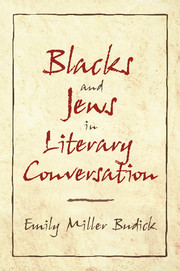Book contents
- Frontmatter
- Contents
- Acknowledgments
- Introduction: “Because you were strangers in the land”
- 1 Mutual Textual Constructions of Black–Jewish Identity
- 2 Crisis and Commentary in African–Jewish American Relations
- 3 Race, Homeland, and the Construction of Jewish American Identity
- 4 Cultural Autonomy, Supersessionism, and the Jew in African American Fiction
- 5 “The Anguish of the Other”: On the Mutual Displacements, Appropriations, and Accommodations of Culture (Toni Morrison, Cynthia Ozick, William Styron, Philip Roth, Grace Paley, and the Jewish–American–Israeli Critic)
- Notes
- Index
5 - “The Anguish of the Other”: On the Mutual Displacements, Appropriations, and Accommodations of Culture (Toni Morrison, Cynthia Ozick, William Styron, Philip Roth, Grace Paley, and the Jewish–American–Israeli Critic)
Published online by Cambridge University Press: 06 July 2010
- Frontmatter
- Contents
- Acknowledgments
- Introduction: “Because you were strangers in the land”
- 1 Mutual Textual Constructions of Black–Jewish Identity
- 2 Crisis and Commentary in African–Jewish American Relations
- 3 Race, Homeland, and the Construction of Jewish American Identity
- 4 Cultural Autonomy, Supersessionism, and the Jew in African American Fiction
- 5 “The Anguish of the Other”: On the Mutual Displacements, Appropriations, and Accommodations of Culture (Toni Morrison, Cynthia Ozick, William Styron, Philip Roth, Grace Paley, and the Jewish–American–Israeli Critic)
- Notes
- Index
Summary
The terror beyond evil is the murder that occurred in the Second World War together with the prospect become familiar of entire and utter annihilation. We are all half-dead of it already, and there is to be opposed to it only a more strenuous and more vivid sensing of human community. There is to be opposed to it only the assertion that despite the hatred in everyone, despite violence, despite weakness and sickness, despite the uncertainty of ordinary reality, despite mortality and the seductions of a myth of eternity, despite everything, the human community is possible – and that, so I have wanted to say, is the theme and the occupation of a literature of what I have called “accommodation.” … “Accommodation” is restoration and love in their ordinary, domestic, painfully contingent instances.
Marcus Klein, After AlienationEven though it is a black critic who first cites the problem of Beloved's relationship to Jewish history, nonetheless my reading of Morrison's novel, through the very slender, perhaps insignificant, opening offered by the dedication and the epigraph, has fundamentally to do with my being a Jewish reader of this text. In a similar way, my uneasiness, in Chapter Three, in relation to the depiction of the Israeli in Bellow's Mr. Sammler's Planet, cannot be separated from my being an Israeli, an identity further complicated by the fact that I consider myself an American as well.
- Type
- Chapter
- Information
- Blacks and Jews in Literary Conversation , pp. 200 - 218Publisher: Cambridge University PressPrint publication year: 1998



